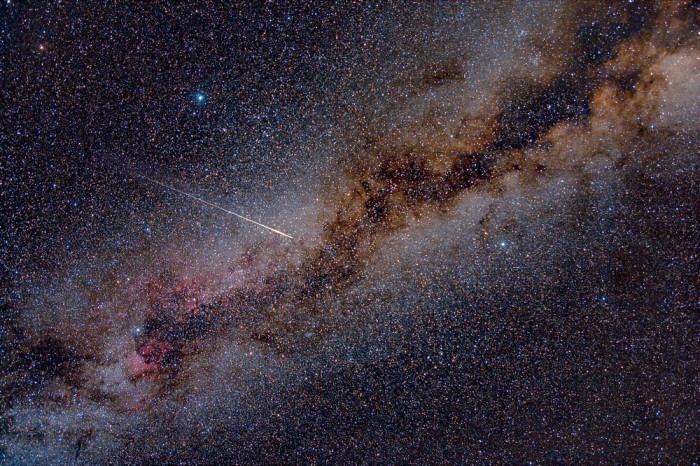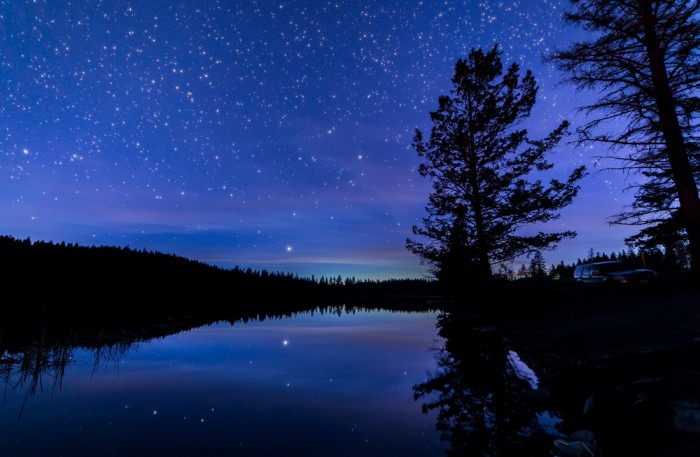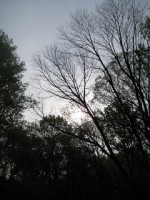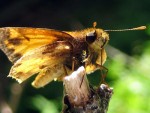If the stars should appear one night in a thousand years,
how would men believe and adore; and preserve for many generations
the remembrance of the city of God which had been shown!But every night come out these envoys of beauty,
and light the universe with their admonishing smile.
―Ralph Waldo Emerson
The night sky is always amazing to behold and ponder, but in mid-August our little planet crosses paths with the Swift-Tuttle comet and pieces of debris enter the Earth’s atmosphere only to burn up in a shining blaze of glory. This year the peak is expected to be on the 13th, with about 50 visible “falling stars” per hour— up to 120 per hour in rural areas with little light pollution.
The 2015 Perseid meteor shower promises to be a particularly spectacular celestial event because of the waning moon; the 14th is the night of the new moon. And here in the mid-Atlantic it’s looking like clear skies until Monday.
This is traditionally the week we spend at the beach, and every year I’m SO FREAKING EXCITED about being able to lie on the beach and watch. And every year it clouds up or even rains (or, if I’m being honest, the peak falls on a weekend and everyone is too talky/intoxicated to want to go to the beach in the middle of the night and I don’t wanna leave the party to go hang out by myself).
The one meteor shower I’ve actually successfully witnessed was the Leonids in November, well over a decade ago. We lived in the city then, and my oldest (who had sleep apnea but we didn’t know it then) used to wake up nearly every hour on the hour. He was maybe five years old at this point. When he woke up around 3am I bundled us both up in blankets and we went out to the top of the slide in our backyard and watched shooting stars until dawn. It was magical, mystical. I’m tearing up thinking about it.
My point is, even though this reliably occurs every year, conditions are rarely ideal the way they are in 2015. Don’t miss out on this chance to create a magical memory with your loved ones.
Tips for watching the Perseid meteor shower:
- Viewing is expected to be best on the evening of the 12th into the morning of the 13th, but meteors should be visible all week.
- East coasters, peak viewing time is between 11pm and 4:30am.
- Early evening is your best chance to see an “earth grazer.” These are slow moving and colorful meteors with long tails that “fall” horizontally. Earth grazers are rare, but amazing to see (we saw one in a pizza parlor parking lot around 9pm a few years ago). And by slow and long, I mean SLOW AND LONG— if I hadn’t been so taken off guard, I definitely would have had enough time to take out my phone and photograph it.
- The farther you can get away from city lights and other light pollution, the better. You’ll also want to find a field where there aren’t trees or structures obstructing your view of the sky. (Locals, here’s where you should go to see the Perseid meteor shower in Delaware.)
- Look in the direction northeast, halfway up into the sky. No telescope or binoculars necessary or even desired, as they limit your field of vision.
- Be patient! I had the best luck just focusing on one section of the sky, rather than constantly scanning.
- Take advantage of this outdoor time to talk to your kids. It’s amazing what they reveal with time, in the dark.
- If attempting to photograph a meteor, mount your DSLR on a tripod and use long exposures, 5-30 seconds. Use a fast wide angle lens for larger field of view and less shake. Turn off autofocus and set the focus to infinity. Do a few trial shots first (ideally previewing on your laptop so as not to change camera potions) to determine the best ISO and then program for several shots at a time or use a remote to start (again, for less shake).
- You can also try meteor photography on your phone with long exposure apps like Slow Shutter Cam, Nightcap Pro or Shutter Stop.
Have you had any luck with meteor showers? Will you be out there tonight?
photos from Depositphoto













Well, I missed it, but my husband and son camped out to see it. I’m hoping for a good report this morning.